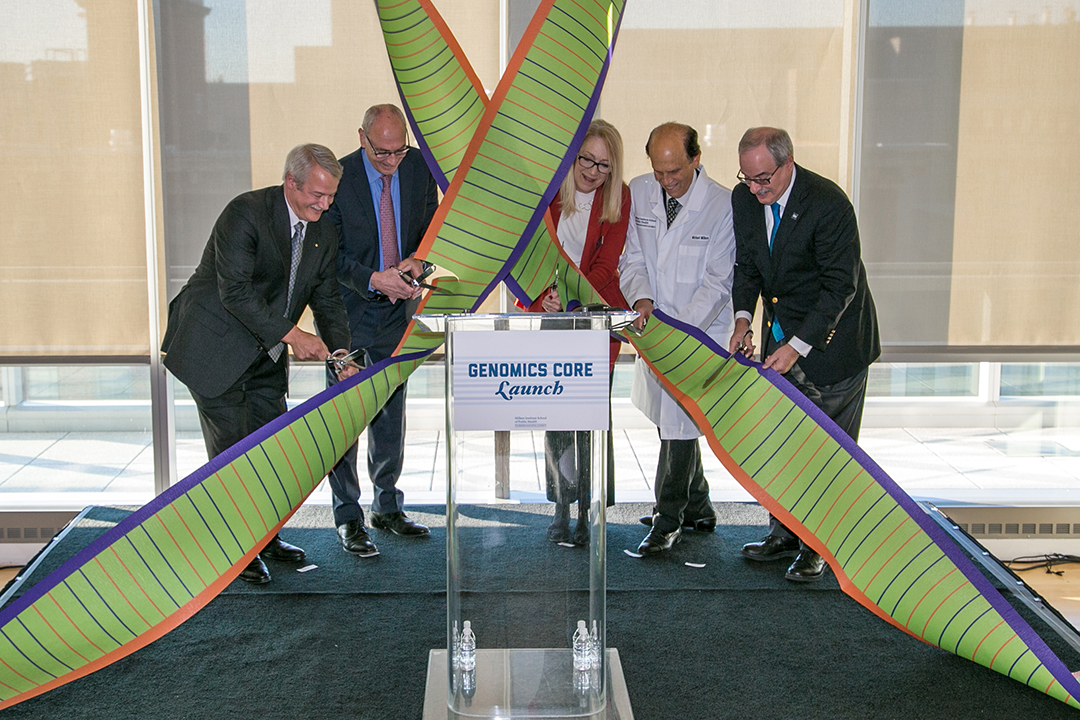By Kristen Mitchell
The Milken Institute School of Public Health officially launched the new Genomics Core Center, a state-of-the-art facility that will help researchers from across the university collaborate to develop genomic approaches that could lead to solutions for some of the world’s most pressing problems, such as climate change or HIV.
University leaders gathered to open the Genomics Core Center Monday morning with a ribbon cutting. The facility is based at the Computational Biology Institute on the seventh floor of Science and Engineering Hall. George Washington University President Thomas LeBlanc said Genomics Core will encourage and support GW faculty and scientists in their pursuit of groundbreaking discoveries and innovations.
Core facilities will allow scientists to fully explore the latest scientific techniques and methods that will yield powerful and impactful results, Dr. LeBlanc said.
“Our new genomics core brings next-generation DNA sequencing to the entire GW community and beyond by providing the equipment and expertise to facilitate genomic research. Instead of having multiple sequencers scattered throughout the university under a desk, this core allows for a central service by trained individuals to produce high-quality data in a centralized environment,” he said. “Data analytics, more specifically genomic sequencing, continue to be an area of growth in terms of education and employment opportunities.”
The Genomics Core Center provides a centralized facility for nucleic acid extraction, genomic sequencing and other services, along with the technical expertise to assist GW researchers and others who are trying to advance a scientific project that would benefit from genomics analysis. The center is led by Keith Crandall, who is also director of the Computational Biology Institute.
Before the Genomics Core launch, researchers had to send out DNA samples for sequencing. This meant they had to plan out exactly what they wanted to do and had less flexibility to adapt their research as it developed. With the core service, researchers will be able to do this work in house and faculty will be able to help one another push the boundaries of genomics by developing new approaches and provide hands-on educational opportunities for students.
Lynn Goldman, the Michael and Lori Milken Dean at the Milken Institute SPH, said the Genomics Core’s importance cannot be understated.
“It has the capacity to analyze large sets of genetic data, advancing scientific understanding of genomes, gene succession and genetic mutation,” Dr. Goldman said. “With the genomics core the Computational Biology Institute can assist cross-disciplinary researchers to apply this approach to solve complex problems that affect all of us.”
The Genomic Core will also provide practical experience for student researchers, Dr. LeBlanc said. GW students will gain knowledge and experience working with genomic sequencing, and will be much better positioned for making an impact in public health, medicine and technology.
Dr. LeBlanc, Dr. Goldman, Dr. Crandall, Vice President for Research Robert Miller and philanthropist Mike Milken participated in the ribbon cutting. Attendees were then invited to tour the Genomic Core Center and hear a keynote address on sequencing sponsored by Illumina, a company that develops gene analysis technology.
The Genomics Core will primarily be used by GW faculty, researchers and students but will also accommodate outside work when possible, especially from collaborators at other institutions. The facility has already worked with faculty from the Milken Institute SPH, School of Medicine and Health Sciences, the School of Engineering and Applied Science and the Columbian College of Arts and Sciences.
The core services have worked on a wide range of research so far from gene expression in blind crayfish in collaboration with the Department of Biology to understanding antibiotic resistance with Milken Institute SPH.




